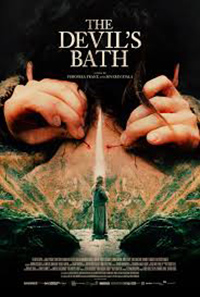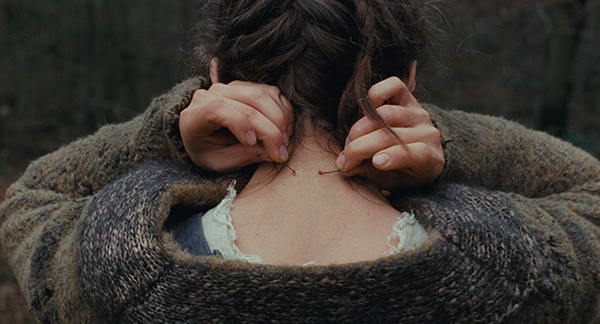Agnes of God: Franz & Fiala’s Bleak Portrait of Women & Madness
 “A Witch is born out of the true hungers of her time,” wrote Ray Bradbury in one of his stories from Long After Midnight (1976), as succinct a phrase as any to convey the cultural facets which historically plagued troubled or troubling women, almost always to forge their doom. The Devil’s Bath, the third feature from Austrian directing duo Veronica Franz and Severin Fiala, is not a film about witches, per se. However, their first period piece, set in 1750 Upper Austria, is most assuredly a horror story, taken from historical court records. The religious mechanisms which also sought to have women tortured, hanged or burned at the stake as witches is the same underlying paradigm influencing the anguished tendencies of murder and self-harm depicted here, led by Anja Plaschg, also known as the musical artist Soap&Skin (and supplying an appropriately moody, upsetting score).
“A Witch is born out of the true hungers of her time,” wrote Ray Bradbury in one of his stories from Long After Midnight (1976), as succinct a phrase as any to convey the cultural facets which historically plagued troubled or troubling women, almost always to forge their doom. The Devil’s Bath, the third feature from Austrian directing duo Veronica Franz and Severin Fiala, is not a film about witches, per se. However, their first period piece, set in 1750 Upper Austria, is most assuredly a horror story, taken from historical court records. The religious mechanisms which also sought to have women tortured, hanged or burned at the stake as witches is the same underlying paradigm influencing the anguished tendencies of murder and self-harm depicted here, led by Anja Plaschg, also known as the musical artist Soap&Skin (and supplying an appropriately moody, upsetting score).
A mother throws her screaming infant off a waterfall and then immediately turns herself into the authorities. She’s executed, and her fingers and toes are cut off, doled out as good luck charms. One woman who receives one of these phalanges as a fertility amulet is Agnes (Plaschg), who will be marrying Wolf (David Scheid), a man from another community. Her hope and excitement begins to abate on their wedding night when Wolf doesn’t seem interested in touching her. His mother (Maria Hofstatter) also seems intent on controlling every aspect of Agnes’ life, which includes ruining a budding friendship with another woman in the community. As Agnes’ dreams dissipate before her eyes, she becomes depressed and lethargic, neglecting her duties as a wife. She’s brought to the local ‘barber’ to cure her melancholia, but his methods involve severe pain as way to let the sadness seep out. Running away to her childhood home, Agnes is told she cannot stay there, and so she seeks death as her only means of escaping a life she has no interest in living. Being Christian, Agnes realizes she cannot kill herself and go to heaven, so she ingests rat poison, believing a slow death will allow her to confess before she dies. When the logistics of this loophole appear futile, she’s driven to a greater act of desperation.

The evolution of Agnes’ plight unfolds quite painstakingly, despite the Grand Guignol suggested by the opening scene’s baby murder and a headless, mutilated corpse left out to rot. Peripheral details at Agnes’ wedding are foreboding, including husband Wolf’s drunken admiration of fellow handsome farmer Lenz (whose demise also informs her later decisions), and a henpecking mother-in-law (played by Ulrich Seidl regular Maria Hofstatter) ostensibly jumpstarts the process immediately. Endless days of non-stop labor paired with cooking meals and nightly chores leaves little time for Agnes to be welcomed into the community. Only church allows her a reprieve. As time passes, and her husband’s refusal to have sex with her results in a lack of children, this is only more evidence to cement her status as pariah.

The Devil’s Bath is far more subtle than Franz and Fiala’s breakout film Goodnight Mommy (2014), or their 2019 follow-up The Lodge, steeped as the production is in authentic period detail while carefully building on events and instances which strip away Agnes’ hope. They present a perfect storm of isolation, despair, and helplessness in her diminishment. While inevitable comparisons will be made with Robert Eggers’ The Witch (2015), it’s more spiritually akin to Peter Brunner’s Luzifer (2021). But Agnes is a protagonist who behaves inversely to the victims we often see in films like this because she’s pious–an innocent. Whereas the rebellious young women in The Crucible engage in behavior which instigated a witch hunt, Agnes turns inward, seeking self annihilation. Her initial loophole also feels like an inverse of another tragic character, Madame Bovary, who also turned to poison for amelioration.
The film’s slow burn pays off royally in the final act, where Agnes (who has come to resemble a similar condition to that of Beatrice Dalle at the end of Betty Blue, 1986) takes drastic, violent action in order to be released from this world. Agnes’ reaction is chilling when she finally attains her morbid goal, and Plaschg’s balance of manic relief and anguish is remarkable. Like Sandrine Bonnaire in Agnes Varda’s Vagabond (1985), Franz and Fiala have mounted a tragic condemnation, a film where the horrors are humans and their pernicious systems of control.
Reviewed on February 20th at the 2024 Berlin International Film Festival – Main Competition section. 121 mins.
★★★★/☆☆☆☆☆


